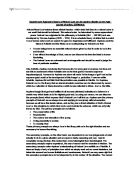Devout Catholics follow the absolutist view of natural law. It is the ethical belief that belief that if you follow something’s natural purpose then it is fulfilling its goal and is right and just. They believe that natural order is determined by some supernatural power and therefore you must follow this. It originated in ancient Greece and was developed much later by Thomas Aquinas (1225-1274). He was a priest of the in the Dominican Order from Italy. He was known as Doctor Angelicus and Doctor Communis. He is frequently referred to as Thomas because "Aquinas" refers to his residence rather than his surname.
Absolutism being a deontological ethical view point it means that when considering whether an action is right or wrong you cannot consider the consequences or result of the decision. This is because absolutism claims that there some things are right or wrong in themselves. No matter what will be the result of these actions. This meaning that absolutism stands on the other side of the hill, metaphorically speaking, to ethical views like relativism, which are teleological ethical arguments.
Relativism takes a situation and looks at the end product of what has happened and if that is a good consequence then it was a good moral decision. For instance there situations where theft could be considered a good moral decision if a parent where to steal food for their child because they couldn’t provide for them this would be classed as a good moral decision as something good cam out of it. Unlike absolutism, Relativism doesn’t take the actual action into account only the result of the action, which is in fact the complete opposite to absolutism, which never takes the consequences of an action into account and only ever the action itself.
‘Moral Absolutism cannot be justified’, Discuss. [10]
There are arguments to suggest that moral absolutism cannot be justified as it is not a reasonable solution to any ethical situation. The theory of moral relativism upholds that there are no universally valid moral principles, opposing the theory of moral absolutism. Relative morals can change according to the situation, where as absolutism leaves no flexibility for certain situations. Some would put forward the view that examining an ethical situation from a teleological point of view is a greater means of deciding how to act than absolutism. Teleological ethics explain that actions are right or wrong depending on the outcome; the outcome of an action is not taken into account in the principles of moral absolutism therefore this could be seen as a weakness, this ties in with an other weakness which would suggest that, because of the earlier principle that consequences or the end result is never taken into account, absolutism could never work. It is an impossible ideal as such. How could you treat every murder as the same? It would be immoral to punish someone, for an act of theft to survive, the same as a person who steals just because they can. If you were to follow absolutism you would not be able to judge between the two and only to punish equally for every act no matter what this consequence or circumstance.
Absolutism is not able to adapt to changes in times and culture. For instance if a law about homosexuality was in place when this was seen as wrong then absolutism could not allow this law to change as it is seen the act of homosexuality is wrong intrinsically and how could an intrinsic value change?
My last point brings me to a major question; if we are following intrinsic laws that are wrong in themselves they must have been wrong forever. Where have they come from? You can only really gain an answer for this if you are religious and believe a divine being that has put these rules upon our nature and world. However if you are a non-believer this is a very difficult question. Perhaps it has become because our society and inevitably culture. But times were once very different and things that we know see as wrong we would have happily done in the middle
Ages.
On the other hand absolutism is very easy follow. E.g. Lying is wrong. There is no if or buts that be given only that something is wrong and therefore you know you cannot do it.
Absolutism can agree with universal laws, such as the declaration of human rights. As it is self can be universally applied and these do not take into account circumstances. Only that for instance everyone has the right to education. Etc.



![Explain Moral Absolutism. [25] Moral absolutism is a deontological view that certain actions are absolutely right or wrong, regardless of the context of the act.](https://mbt-essays-prod-public.s3.eu-west-1.amazonaws.com/877956/listing/877956_1.jpg)



